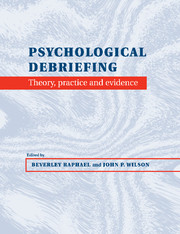Book contents
- Frontmatter
- Contents
- List of contributors
- Introduction and overview: Key issues in the conceptualization of debriefing
- Part I Key conceptual framework of debriefing
- 1 Stress management and debriefing: historical concepts and present patterns
- 2 Debriefing: its role in the spectrum of prevention and acute management of psychological trauma
- 3 Briefing and debriefing: group psychological interventions in acute stressor situations
- 4 Theoretical perspectives of traumatic stress and debriefings
- Part II Debriefing: models, research and practice
- Part III Adaptations of debriefing models
- Part IV Debriefing overview and future directions
- Conclusion: debriefing – science, belief and wisdom
- Index
4 - Theoretical perspectives of traumatic stress and debriefings
from Part I - Key conceptual framework of debriefing
Published online by Cambridge University Press: 06 January 2010
- Frontmatter
- Contents
- List of contributors
- Introduction and overview: Key issues in the conceptualization of debriefing
- Part I Key conceptual framework of debriefing
- 1 Stress management and debriefing: historical concepts and present patterns
- 2 Debriefing: its role in the spectrum of prevention and acute management of psychological trauma
- 3 Briefing and debriefing: group psychological interventions in acute stressor situations
- 4 Theoretical perspectives of traumatic stress and debriefings
- Part II Debriefing: models, research and practice
- Part III Adaptations of debriefing models
- Part IV Debriefing overview and future directions
- Conclusion: debriefing – science, belief and wisdom
- Index
Summary
EDITORIAL COMMENTS
In this chapter, Wilson and Sigman emphasize the complexity and diversity of responses to extreme events, and the need to take those factors into account. debriefing they suggest is one of a spectrum of posttrauma interventions that may be encompassed in frameworks such as Critical Incident Stress Management, crisis intervention and many others. However, the focus in this chapter is on a thorough examination of the theoretical underpinning of all such interventions and indeed the critical and unanswered questions that this whole field generates. The authors describe a range of components from education to counselling in the response set of debriefings and see these as being on a spectrum that includes, or is linked to concepts such as crisis intervention. They also emphasize the need to define the conceptual pillars of debriefing, building on the experience of applying such techniques as well as any empirical findings. The more complex the situation the greater is the need for a ‘complex decision-making protocol to design helpful interventions and identify the appropriate timing of these’. In the balance of the equation questions arise as to pathologizing the experience as opposed to facilitating true coping and resilience, and also the expectancies potentially raised by debriefing processes. They propose a person-environment interactional process in response to, and resolution of, trauma and that debriefing should be conceptualized within this framework.
Keywords
- Type
- Chapter
- Information
- Psychological DebriefingTheory, Practice and Evidence, pp. 58 - 68Publisher: Cambridge University PressPrint publication year: 2000
- 4
- Cited by



